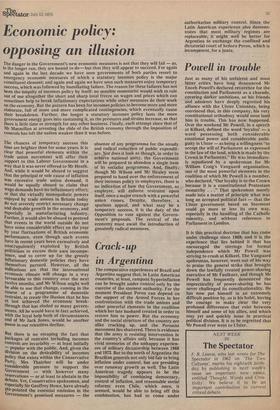Powell in trouble
Just as many of his unfairest and most bitter critics have long denounced Mr Enoch Powell's declared reverence for the constitution and Parliament as a charade, covering darker ambitions, so his friends and admirers have deeply regretted his alliance with the Ulster Unionists, being convinced that, in this company, his very constitutional orthodoxy would soon land him in trouble. This has now happened. Over the weekend Mr Powell, in a speech at Kilkeel, defined the word 'loyalist' — a word possessing both considerable emotional power and considerable ambiguity in Ulster — as being a willingness "to accept the will of Parliament as expressed in the law of the land, which is made by the Crown in Parliament." He was immediately repudiated by a spokesman for Mr William Craig's Vanguard organisation, one of the most powerful elements in the coalition of which Mr Powell is a member, who declared, "Our loyalty is to the Crown because it is a constitutional Protestant monarchy . . ." That spokesman merely made into a matter of principle what was long an accepted political fact — that the Ulster government based on Stormont could go more or less its own way, especially in the handling of the Catholic minority, and without reference to Parliament in London.
It is this practical doctrine that has come under challenge since 1969; and it is the experience that lies behind it that has encouraged the stirrings for formal independence which Mr Powell was striving to crush at Kilkeel. The Vanguard spokesman, however, went out of his way to praise the general strike that brought down the lawfully created power-sharing executive of Mr Faulkner, and though Mr Powell has frequently denounced the impracticality of power-sharing he has never challenged its constitutionality. He has now put himself in an extremely difficult position by, as is his habit, having the courage to make clear the very profound differences that exist between himself and some of his allies, and which may yet and quickly issue in practical political division. It is to be regretted that Mr Powell ever went to Ulster.


































 Previous page
Previous page